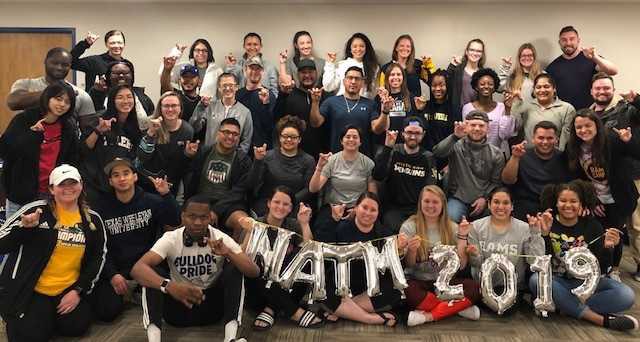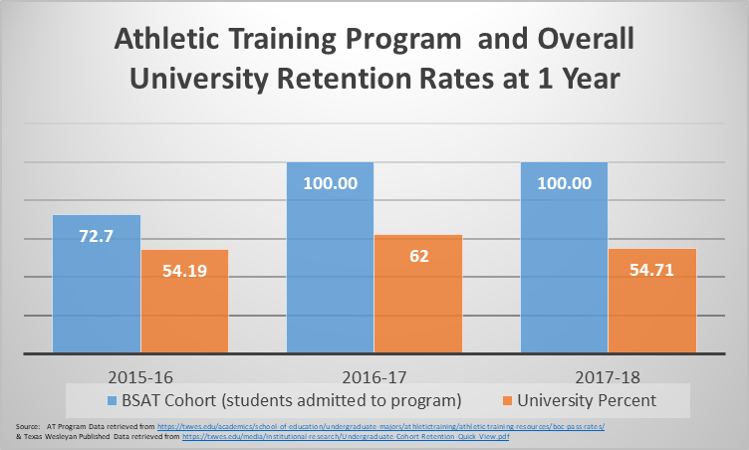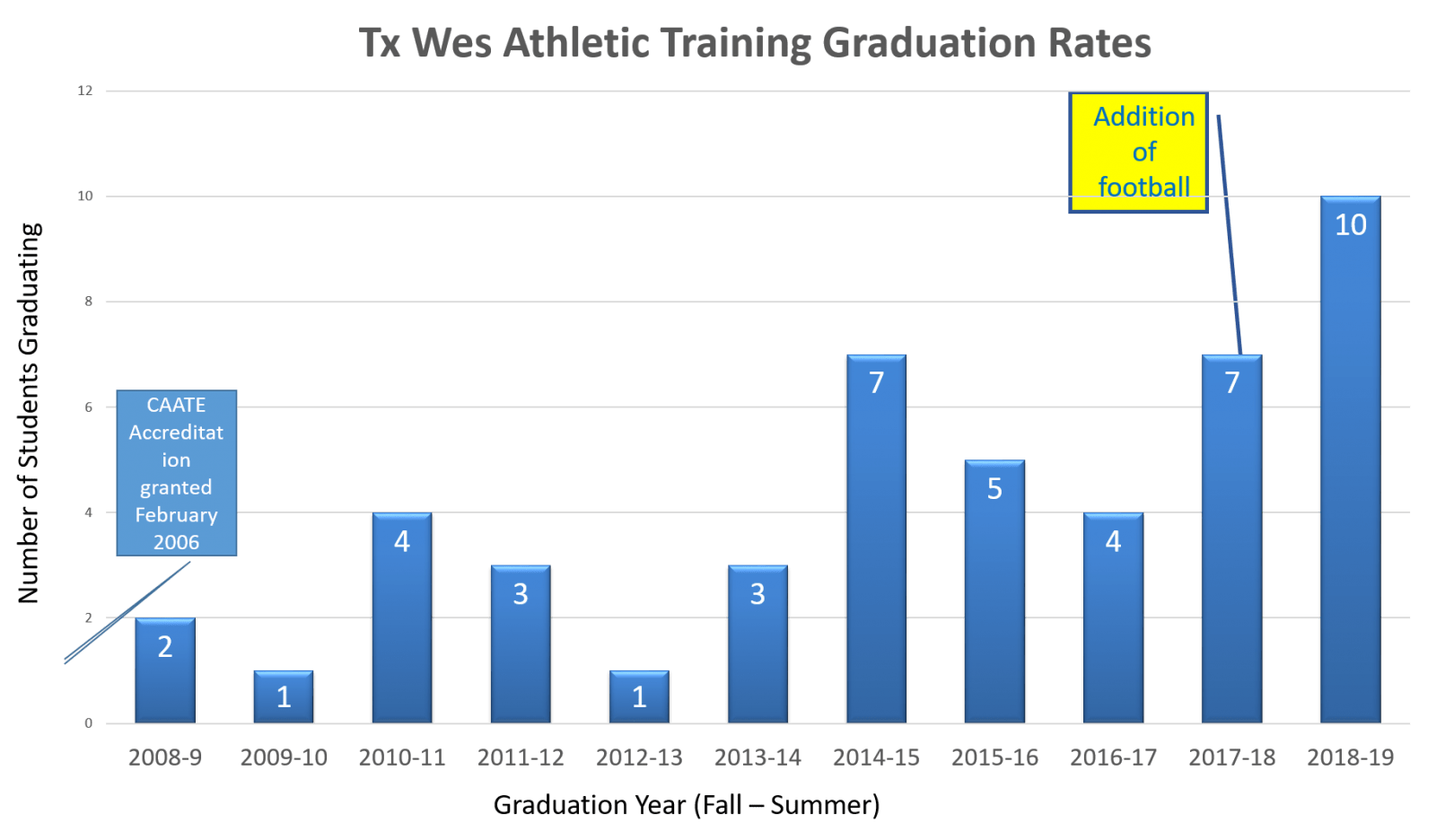Texas Wesleyan will start phasing out its athletic training program and will welcome its last class of students in the summer and fall of 2019.
The program is coming to an end because the Commission on Accreditation of Athletic Training Education (CAATE) has decided to only certify athletic trainers with master’s degrees rather than a bachelor’s degree, according to an email from Wesleyan Provost Allen Henderson.
“The NATA Board of Directors and the Commissioners of the CAATE, with the full support of the Board of Certification and the NATA Research & Education Foundation,” Henderson wrote, “agreed to establish the professional degree in athletic training at the master’s level.”
CAATE announced the change in standards for athletic trainers during the 2016-2017 school year, Henderson wrote.
“CAATE will allow Texas Wesleyan’s athletic training program to teach out all current students and those admitted for Fall 2019 over the next four years,” he wrote.
Dr. Pam Rast, program director of Athletic Training Education, said this is something CAATE has been working on for around five years.
Athletic training is a professional program much like physical therapy or occupational therapy and it is hard for students to complete a program as rigorous as that while trying to complete GEC courses at the same time, Rast said.
“My reaction to the direction that athletic training is going as an entry level master’s degree is something that is really a long time overdue,” Rast said.
Rast was the first full-time athletic trainer hired at Texas Wesleyan in 1994 and she was a part of getting the AT program started, she said. The role of an athletic trainer is so important because they are the ones who first respond to an athlete’s injury.
“Athletic trainers are on the sidelines, watching their patients,” Rast said. “Even if an athlete is not injured, they are our patients. If that patient gets injured the athletic trainer is the very first person there to provide care. Sometimes it is lifesaving kind of care for that athlete.”
Rast said she worked on getting the master’s program started but was told by the school that Wesleyan will not go forward with it.
“For me individually, it is kind of like a kick in the gut because I was brought here to start the program,” she said.
Henderson wrote that Wesleyan decided not to move forward with a master’s program because “firm data and an in-depth market and financial analysis clearly showed that from a demand, cost and competition standpoint, Texas Wesleyan would not be able to successfully support and sustain an athletic training master’s program.”
“The decision to not offer a master’s program in athletic training is in no way a reflection of our current athletic training program,” Henderson wrote. “Our athletic training students and faculty are extremely talented and have a history of excellence.”
Rast said she feels like she is trying to fight the fight again to explain why athletic training is such an important program to have on campus.
“I have been told that, ‘Oh in a couple of years we may want to do the master’s degree,’” Rast said. “The reality is once you are an accredited program, it is all the same whether you are an undergraduate or graduate program. It is all accredited.”
When the last group of students coming in apply for the clinical program in 2020, the school will have to apply for a voluntary withdrawal of accreditation, Rast said, which brought tears to her eyes.
“You work so hard to get it to then voluntarily say, we are going to give it up,” Rast said. “But the reality is, once we do that, if they come along in two years and they say, ‘Well, we have decided that we want to have a master’s degree of athletic training,’ well, we are no longer accredited.”
Senior athletic training major Kaitlyn Baugh said she is grandfathered in so she will not have to receive a master’s degree.
“I could but I don’t want to because personally I am ready to be done with school. I am going to hopefully pass my BOC test in June,” Baugh said. “I either want to work in a college setting like here or do contracting work.”
Baugh said she does not understand why Wesleyan would not want to have a master’s program for athletic training.
“I do not agree with it because I am also an athlete,” said Baugh, who is a member of the women’s soccer team at Wesleyan. “From the athlete’s point of view, I see how much the students actually help the head AT, who is head of that sport in general.”
Baugh said she believes that the school would be able to bring in enough students for a master’s program, despite what the school says.
“There are 42 of us in the program right now,” she said. “We seem to bring in a decent amount, but they don’t seem to think we do.”
Baugh said whenever she goes to get treatment in the athletic training room, it is usually a student who helps her.
“If they don’t have the students, which is going to happen, when they don’t have students there any more, you are going to be waiting there 20 or 30 minutes to get your treatments done so you can practice,” she said. “It is not the best situation.”
Rast said that especially with the addition of wrestling to the school, Wesleyan will need to hire more trainers.
“We have 42 students in the athletic training program right now and of course those numbers will dwindle as time goes on because we will be teaching them out,” Rast said. “As that happens, I hate to say it, but it will be less and less help for our athletic trainers who work with our athletic programs.”
Wesleyan President Frederick Slabach said that the end of the athletic training program and the appropriate care for student athletes in terms of athletic trainers are two different issues.
“With respect to the academic program, I want to make sure that everybody understands, all of our current students, our wonderful athletic training students, are going to be able to complete their athletic training bachelor’s degree here at Texas Wesleyan and then sit for their licensure exams,” he said.
As far as athletic trainers go, Slabach said Wesleyan has full-time athletic trainers and the students who are in the athletic training program that are aiding them will continue to do that until the end of the program in 2023.
“After that time, we will provide the appropriate services to our student athletes,” Slabach said. “We will continue to do so and if we feel the need to hire additional resources for our student athletes we will do so.”
Henderson wrote that the school is incredibly proud of its athletic trainers, athletic training students and athletic training faculty.
“Our athletic training students and faculty are extremely talented and have a history of excellence,” he wrote. “Their work is life-saving and we applaud them for their contributions to the field and to athletes across North Texas – especially our athletes at Texas Wesleyan. We are dedicated to seeing our current athletic training students through our high-quality program and supporting them as they work toward graduation and passing their certification exam.”

Photo contributed by Dr. Pam Rast

Graphic contributed by Dr. Pam Rast

Graphic contributed by Dr. Pam Rast









![Pippin, played by Hunter Heart, leads a musical number in the second act of the musical. [Photo courtesy Kris Ikejiri]](https://therambler.org/wp-content/uploads/2025/04/Pippin-Review-1200x800.jpg)
![Harriet and Warren, played by Trinity Chenault and Trent Cole, embrace in a hug [Photo courtesy Lauren Hunt]](https://therambler.org/wp-content/uploads/2025/02/lettersfromthelibrary_01-1200x800.jpg)
![Samantha Barragan celebrates following victory in a bout. [Photo courtesy Tu Pha]](https://therambler.org/wp-content/uploads/2025/05/20250504_164435000_iOS-834x1200.jpg)





![Hunter Heart (center), the play's lead, rehearses a scene alongside other student actors. [Photo courtesy Jacob Sanchez]](https://therambler.org/wp-content/uploads/2025/04/thumbnail_IMG_8412-1200x816.jpg)
![Student actors rehearse for Pippin, Theatre Wesleyan's upcoming musical. [Photo courtesy Jacob Rivera-Sanchez]](https://therambler.org/wp-content/uploads/2025/04/Pippin-Preview-1200x739.jpg)
![[Photo courtesy Brooklyn Rowe]](https://therambler.org/wp-content/uploads/2025/05/CMYK_Shaiza_4227-1080x1200.jpg)

![Lady Rams softball wraps up weekend against Nelson Lions with a victory [6 – 1]](https://therambler.org/wp-content/uploads/2025/04/Screenshot-2025-04-04-100924-1200x647.png)
















![The Texas Wesleyan University women's golf team walks the course. [Photo courtesy of Corrina Griffin]](https://therambler.org/wp-content/uploads/2025/04/rounds-902x1200.jpg)